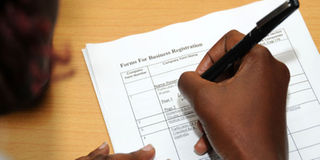Solve financial uncertainty by planning your expenditures

Planning for your finances will protect you from making unrealistic expenditure decisions. It will also relieve you alot of stress that comes with haphazard or unplanned expenditures. FILE Photo
What you need to know:
If you know how much money you are working with, you can make wise choices.
I just returned to work this week after an absolutely fantastic two weeks break, visiting friends and family. My employer has a policy that requires every employee to take leave for at least ten consecutive working days once every calendar year. This two week break benefits both the company and us the employees.
The company gets to test its continuity plans and ensures that there is no unhealthy reliance on a particular individual and that nothing untoward or fraudulent is being perpetrated by the employee. The employee on the other hand gets a well deserved break to rest, “recharge” and follow up any personal projects.
My experience with block leave as we refer to it at Standard Chartered is that it can be a double edged sword since it tests one’s discipline especially in the area of personal finance. We have all heard the saying “time is money”; indeed when you are on leave and have more time on your hands you spend more money.
Holiday-makers generally tend to eat out more, they make more trips to places of entertainment and purchase stuff they would ordinarily not consider buying because they now have the time to wander around the Supermarket (a practice that I have found to be both costly and time wasting).
Additionally holiday time involves visiting friends and family that we don’t get a chance to see during our busy work schedules. If your holiday involves a trip to the village then expect to part with a decent amount of money on donations and public relations if you get my drift.
A good friend of mine likes to spend a considerable amount of time of his leave upcountry visiting family. Given his position in the family; he is the first born, he has to do his parents proud by being some sort of local donor in the village.
He has given up trying to lecture or rebuke his extended family about their unrealistic expectations and instead now always makes a trip to the bank prior to his upcountry trips, to withdraw a budgeted amount of money that he draws in coins and small value notes which he then “generously” distributes when approached for donations by his extended family members in the village.
It is strongly recommended that one gets into the habit of planning for every predictable event of their lives and holidays are no exception.
My mentor taught me this discipline many years ago and would repeatedly admonish me to stop worrying about life and start planning it instead. He always emphasized the fact that a plan is a road map that can be modified, improved and even changed while lack of a plan makes one an automatic loser as one has no direction and their destination is unclear or unknown.
Too many of us loathe the idea of planning every aspect of our lives as we find the practice both laborious and suffocating. The sad reality is that due to urbanisation, the cost of living will keep rising meaning that not planning is more work than sitting down to plan one’s personal finances.
Plan the holiday
Holidays should be a time to have fun and forget about our cares and burdens. It is therefore a shame to spend this precious time worrying about money and being on the edge.
The only way to ensure you enjoy peace of mind during these well deserved breaks and throughout your life for that matter is to have a plan.
A plan sharpens your focus and helps you prioritize. When you take the time to think through your plans for the holiday, it is not uncommon to find that your budget cannot cover half the things you would like to do.
This helps you rethink your plan, rearrange your priorities and decide which activities are an absolute must-have and which ones can wait.
Better still if you know how much money you are working with, you can make wise choices around what entertainment activities you engage in, where and how often you should eat out and how much money (transport and shopping) you need to set aside for visits to different relatives.
This way you make every interaction and outing count. It also helps you spread out the fun instead of starting the holiday with a “bang” and then having to end it scratching and scraping.
Staying on track
It is always interesting to watch people when they return from holiday. A good number of us go on diet after a great holiday because we have been indulging in food and drink. We freely speak about how we over ate and how we need to get back in shape.
What we are less willing to share are the details of the deep financial hole we have dug ourselves into due to unplanned spending. This does not have to be the case if we make the time to plan every holiday and work with a budget.
I would rather agonize about my holiday before it comes than spend my well deserved break wondering how I will recover from unplanned expenditures.
We spend an inordinate amount of time worrying about work related stress; so when you take your leave it should be a time of relaxation and peace. Planning this time off work will provide a much needed dose of reality around your personal finances and hopefully help ensure that you live within your means even when you are on holiday.
Grace Makoko is Standard Chartered’s Head of Financial Markets, East Africa
e-mail: [email protected]




